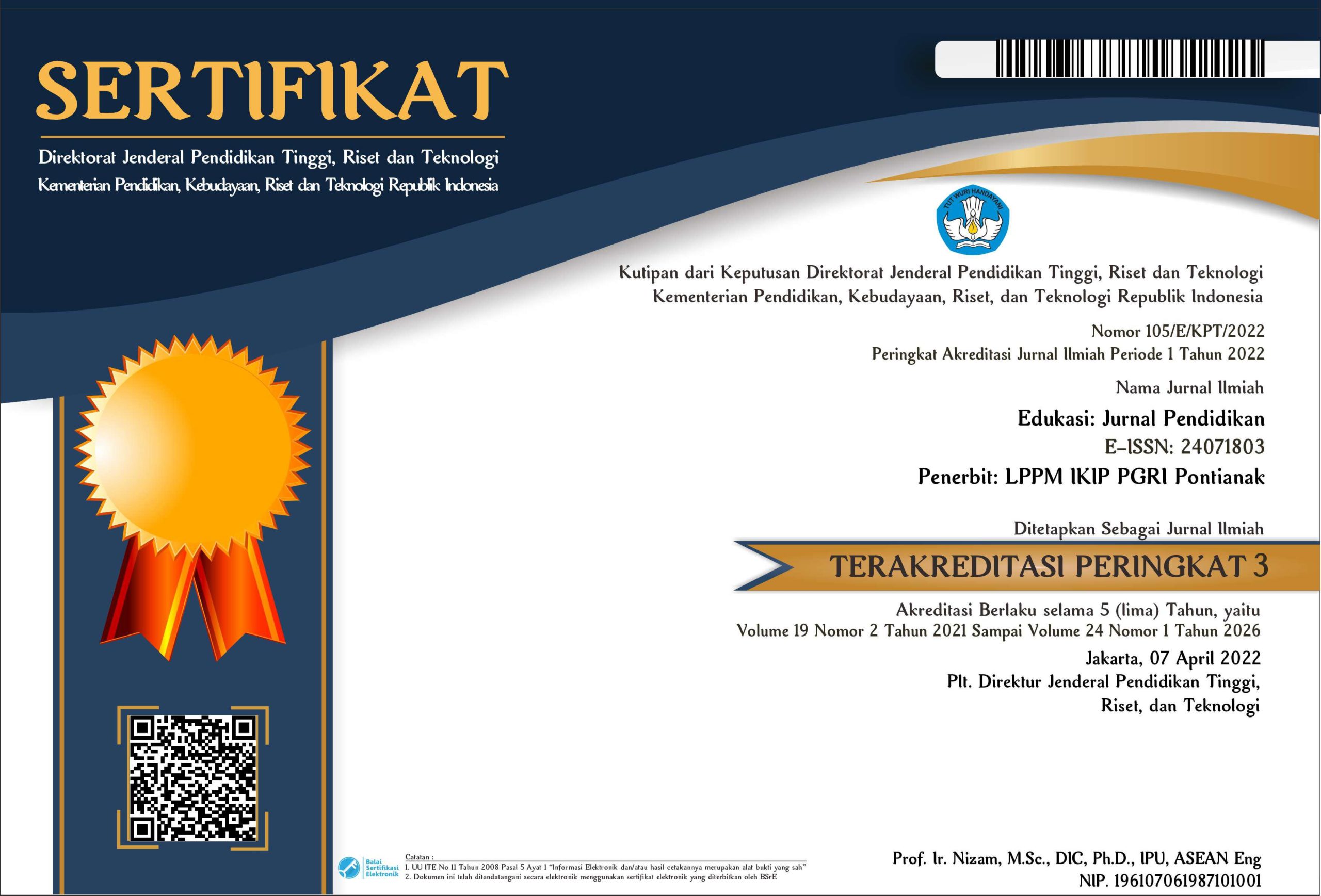Safe Exam Browser untuk Klien Android pada Ujian Berbasis Web
DOI:
https://doi.org/10.31571/edukasi.v17i2.1454Keywords:
flyexambro, browser, ujian online, Android, komputer, online examination, computerAbstract
Abstrak
Penelitian bertujuan untuk menghasilkan sebuah browser (flyexambro) yang valid berbasis Android dengan membatasi akses terhadap fitur-fitur di perangkat handphone. Metode penelitian menggunakan pengembangan aplikasi model Extreme Programming (XP) yang terdiri dari tahapan: analisis kebutuhan; desain antarmuka; pengembangan dan implementasi; pengujian dan modifikasi; serta launching. Subjek penelitian sebanyak 90 siswa, terdiri dari 45 siswa ujian berbasis komputer dan 45 siswa ujian berbasis handphone. Alat pengumpulan data menggunakan tes pilihan ganda. Teknik analisis data menggunakan uji-t. Pengujian dilakukan untuk 2 pelajaran, yaitu Bahasa Indonesia dan Matematika. Nilai yang diperoleh dari kedua pengujian tersebut dianalisis untuk melihat perbedaannya. Berdasarkan hasil analisis data, tidak ditemukan perbedaan yang signifikan antara ujian berbasis komputer dan ujian berbasis handphone. Penggunaan browser saat ujian menggunakan handphone dapat dan layak menggantikan client berbasis komputer dari segi keamanan, kenyamanan, dan kemudahan pemakaian.
Â
Abstract
The research aims to produce a valid browser (flyexambro) based on Android by restricting access to features in mobile devices. The research method used the application development Extreme Programming (XP) model which consists of stages: needs analysis; interface designing; development and implementation; testing and modification; and launching. The research subjects were 90 students, consisting of 45 computer-based exam students and 45 mobile-based exam students. Data collection tools use multiple-choice tests. Data analysis techniques using t-test. The test was conducted for 2 lessons, namely Indonesian Language and Mathematics. The values obtained from the two tests are analyzed to see the difference. Based on the results of data analysis, no significant differences were found between computer-based and mobile-based exams. The use of this browser for exams using mobile phones can and is feasible to replace computer-based clients in terms of security, comfort, and ease of use.Downloads
References
Aiken, L. R. 1980. Content Validity and Reliability of Single Items or Questionnaires. Educational and Psychological Measurement, 40(4): 955–959.
Al-Nadabi, Z. 2015. Features of an Online English Language Testing Interface. Australasian Society for Computers in Learning and Tertiary Education, Perth: 30 November 2015. Hal: 369-373.
Databoks, 2019. Penggunaan Smartphone Indonesia 2016 Sampai 2019 dalam https://databoks.katadata.co.id/datapublish/206/08/08/pengguna-smartphone -di-indonesia-2016-2019). Diakses 5 Agustus 2019.
Ericsson. 2014. Ericsson Mobility Report. Ericsson, Inc. dalam http://www.ericsson.com/res/docs/2014/ericssonmobility-report-june-2014. pdf. Diakses 5 Agustus 2019
Frankl, G., Schartner, P., & Zebedin, G. 2012. Secure Online Exams Using Students' Devices. Global Engineering Education, 23(50): 17-27.
Frankl, G., Schartner, P., & Jost, D. 2017. The Secure Exam Environment: E-Testing with Students Own Devices. Tomorrow’s Learning: Involving Everyone. IFIP World Conference on Computers in Education. Dublin: 7 Juli 2019. Hal: 179-188.
Holzinger, A., Errath, M., Searle, G., Thurnher, B., & Slany, W. 2005. From Extreme Programming and Usability Engineering to Extreme Usability in Software Engineering Education (XP+ UE/Spl Rarr/XU). Annual International Computer Software and Applications Conference. Edinburg: 28 Juli 2005. Hal: 169-172.
James, K. 2014. What is Kiosk Mode dalam https://www.kioware.com/ resources.aspx? resid=45. Diakses 8 September 2019.
James, K. 2018. Kiosk Mode dalam https://technostacks.com/blog/android-kiosk-mode/. Diakses 8 September 2019.
Kaiiali, M., Ozkaya, A., Altun, H., Haddad, H., & Alier, M. 2016. Designing A Secure Exam Management System (SEMS) for M-Learning Environments. IEEE Transactions on Learning Technologies, 9(3): 258-271.
Lüthi, T., Kern, M., Reuter, K., Halbherr, T., & Piendl, T. 2019. Competence-Oriented Exams Using Virtual Desktop Infrastructure (VDI). Technical Report, 3rd Edition, Revised and Updated dalam https://www.safeexambrowser.org/about_overview_en.html. Diakses 8 September 2019.
Li, X. & Li, Y. 2016. The Design and Implementation of Mobile Online Testing System based on Android Platform. International Conference on Education, Management, Computer and Society. Atlantis: 16 Januari 2016. Hal: 820-823
Mozilla. 2012. Mobile first dalam https://developer.mozilla.org/en US/docs/Web/ Progressive_web_apps. Diakses 19 Oktober 2019.
Petter, S., DeLone, W., & McLean, E. R. 2013. Information systems success: The Quest for the Independent Variables. Journal of Management Information Systems, 29(4): 7-62.
Sarrayrih, M. A. & Ilyas, M. 2013. Challenges of Online Exam, Performances and Problems for Online University Exam. International Journal of Computer Science Issues (IJCSI), 10(1): 439-445.
Sukadarmika, G., Hartati, R. S., & Sastra, N. P. 2018. Introducing TAMEx model for Availability of e-Exam in Wireless Environment. International Conference on Information and Communications Technology (ICOIACT). Bali: 3 Juni 2018. Hal:163-167.
Torgerson, C. J. & Torgerson, D. J. 2017. True Experimental Designs. The BERA/SAGE Handbook of Educational Research. London: 12 Juli 2017. Hal: 416.
William, H. 2012. What is Lock Down Browser dalam https://www.igi-global.com/dictionary/technological-approaches-maintaining-academic-in-tegrity/17447. Diakses tanggal 8 September 2019.
Downloads
Published
How to Cite
Issue
Section
License
Authors who publish in this journal agree to the following terms:
- Authors retain copyright and grant the journal the right of first publication with the work simultaneously licensed under a Creative Commons Attribution License (CC-BY-NC) that allows others to share the work with an acknowledgment of the work's authorship and initial publication in this journal.
- Authors are able to enter into separate, additional contractual arrangements for the non-exclusive distribution of the journal's published version of the work (e.g., post it to an institutional repository or publish it in a book), with an acknowledgment of its initial publication in this journal.
- Authors are permitted and encouraged to post their work online (e.g., in institutional repositories or on their website) prior to and during the submission process, as it can lead to productive exchanges, as well as earlier and greater citation of published work.

 Download: 650
Download: 650


















